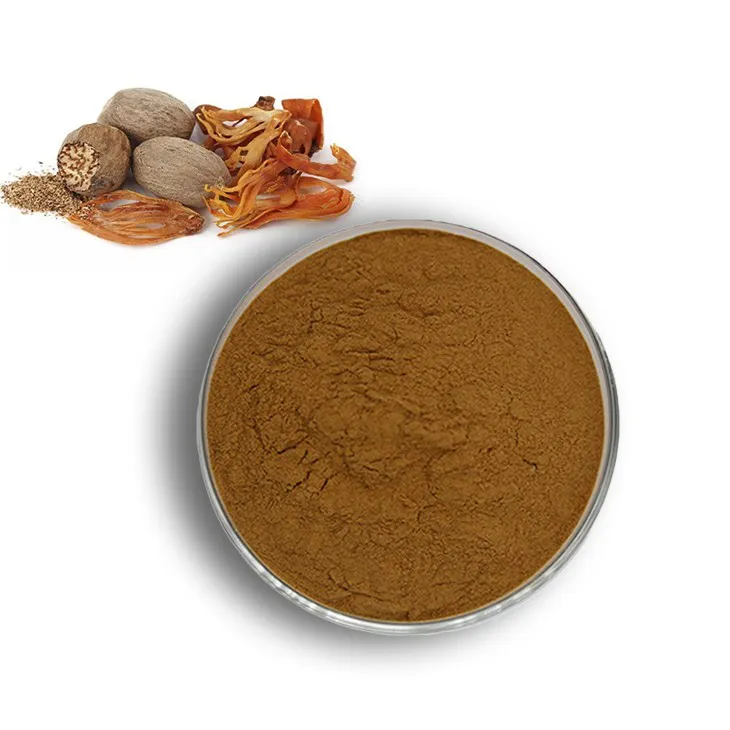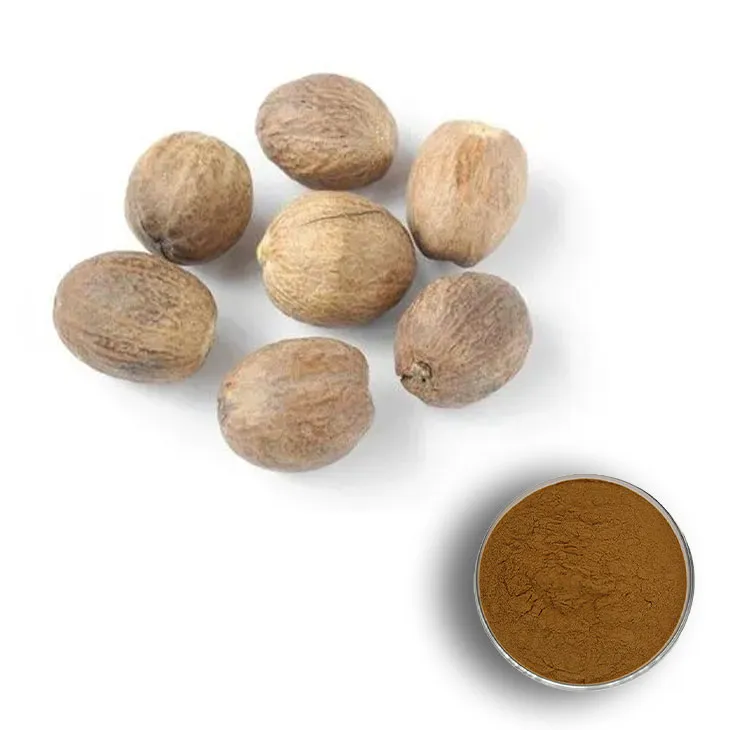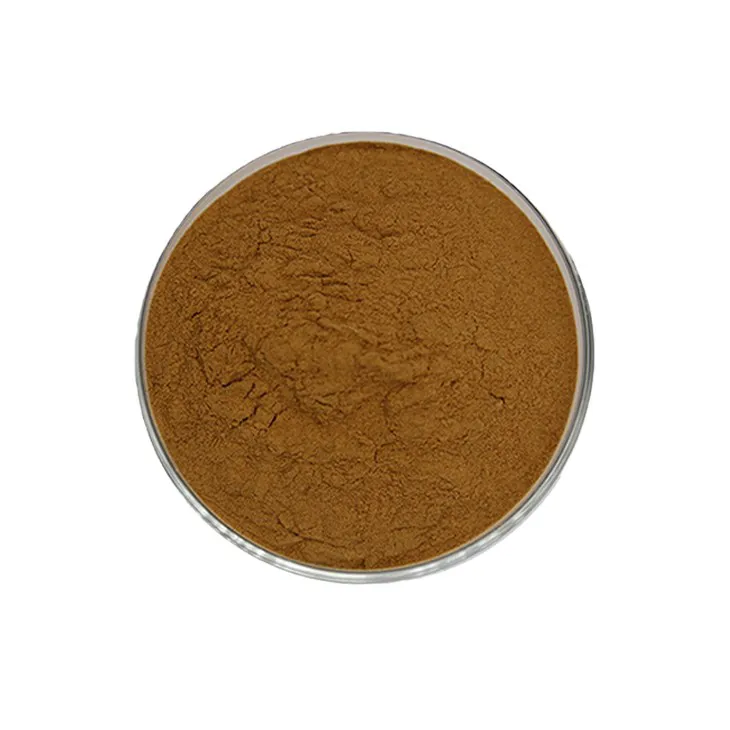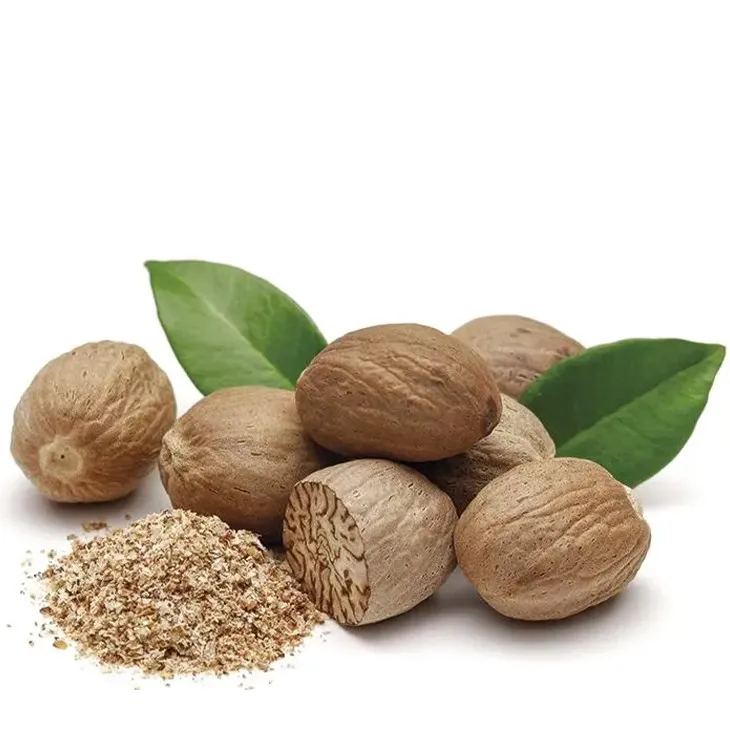- 0086-571-85302990
- sales@greenskybio.com
The Best Sources of Natural Nutmeg Extract.
2024-11-26

Introduction
Nutmeg, a beloved spice known for its warm, spicy, and slightly sweet flavor, has been used in cooking, traditional medicine, and perfumery for centuries. The extract of nutmeg contains a variety of valuable compounds, including essential oils, myristicin, and elemicin. These components are responsible for its distinct aroma, flavor, and potential health benefits. In this article, we will explore the best sources of natural Nutmeg Extract, taking into account factors such as geographical regions, cultivation methods, and extraction processes.

Geographical Regions
Indonesia
Indonesia is one of the top producers of nutmeg in the world. The country's tropical climate, with high humidity and consistent rainfall, provides an ideal environment for nutmeg trees to thrive. The Moluccas islands, also known as the Spice Islands, are particularly renowned for their high - quality nutmeg production. The soil in this region is rich in nutrients, which are absorbed by the nutmeg trees and contribute to the development of flavorful and potent nutmeg fruits.
- The traditional cultivation methods passed down through generations in Indonesia ensure that the nutmeg trees are well - cared - for. Farmers are often highly experienced in tending to these trees, from the initial planting to the harvesting stage.
- Due to the large - scale production in Indonesia, there is a well - established infrastructure for processing nutmeg into extract. This includes modern extraction facilities that can efficiently and cleanly extract the valuable compounds from the nutmeg fruits.
India
India has a long - standing history of nutmeg cultivation, especially in the southern states. The climate in parts of South India, with its warm temperatures and monsoon rains, is conducive to growing nutmeg. Kerala, in particular, is known for its nutmeg plantations.
- Indian farmers often use a combination of traditional and modern agricultural techniques. For example, they may use organic fertilizers to enhance the soil quality, which can result in nutmeg with a unique flavor profile.
- The cultural significance of nutmeg in India also plays a role in its production. Nutmeg has been used in Ayurvedic medicine for centuries, and this traditional knowledge influences how it is cultivated and processed. As a result, Indian - sourced Nutmeg Extract may have different characteristics compared to that from other regions, potentially offering distinct health benefits.
Grenada
Grenada is known as the "Island of Spice" and is famous for its high - quality nutmeg production. The Caribbean climate, with its warm and sunny days and gentle rainfall, provides a perfect setting for nutmeg trees.
- Grenadian nutmeg is often associated with a pure and intense flavor. The small - scale, family - run farms in Grenada take great pride in their nutmeg production. They use sustainable farming practices, which not only benefit the environment but also contribute to the overall quality of the nutmeg fruits.
- The extraction processes in Grenada may be more artisanal in nature compared to larger - scale producers. This can result in a Nutmeg Extract with a more natural and unadulterated flavor, which is highly sought - after by consumers who prefer products with a more traditional touch.

Cultivation Methods
Organic Cultivation
Organic cultivation of nutmeg is becoming increasingly popular, especially among consumers who are concerned about the use of pesticides and chemical fertilizers. Organic nutmeg farms rely on natural methods to control pests and improve soil fertility.
- Composting is a common practice on organic nutmeg farms. Organic waste such as fallen leaves, manure, and kitchen scraps are composted and used as a natural fertilizer. This enriches the soil with essential nutrients, resulting in healthier nutmeg trees.
- Beneficial insects are introduced to the nutmeg orchards to control pests. For example, ladybugs can be used to prey on aphids, which are harmful to nutmeg trees. This natural pest control method reduces the need for chemical pesticides.
- Nutmeg grown organically may have a more complex flavor profile. The absence of chemical inputs allows the nutmeg to develop its natural flavors and aromas more fully. Additionally, organic nutmeg extract may be more appealing to consumers who are looking for "clean" and natural products for use in food, cosmetics, or natural remedies.
Traditional vs. Modern Cultivation
In many regions, traditional cultivation methods co - exist with modern techniques.
- Traditional cultivation often involves more manual labor. For example, in some Indonesian villages, farmers still use hand - tools for tasks such as pruning and harvesting nutmeg trees. This hands - on approach can result in a more careful selection of ripe nutmeg fruits, which is crucial for obtaining high - quality extract.
- Modern cultivation techniques, on the other hand, make use of machinery and advanced agricultural technology. For instance, irrigation systems can be precisely controlled to ensure that nutmeg trees receive the optimal amount of water. This can lead to more consistent yields and potentially larger nutmeg fruits.
- However, modern cultivation may also introduce some challenges. For example, the over - use of chemical fertilizers and pesticides in some modern farms can have a negative impact on the quality of the nutmeg and its extract. Therefore, a balance between traditional and modern methods is often necessary to produce the best - quality nutmeg extract.

Extraction Processes
Solvent Extraction
Solvent extraction is a commonly used method for obtaining nutmeg extract. In this process, a solvent such as ethanol or hexane is used to dissolve the desired compounds from the nutmeg.
- Ethanol extraction is often preferred for natural nutmeg extract production, especially for applications in the food and beverage industry. Ethanol is a relatively safe and natural solvent that can effectively extract the essential oils and other active compounds from nutmeg. It also evaporates relatively easily, leaving behind a relatively pure nutmeg extract.
- Hexane extraction, although more efficient in some cases, has some drawbacks. Hexane is a petroleum - based solvent, and there are concerns about residual hexane in the final product. However, if the extraction process is carefully controlled and the hexane is completely removed through proper purification steps, high - quality nutmeg extract can still be obtained.
Steam Distillation
Steam distillation is another popular method for extracting nutmeg extract.
- In steam distillation, steam is passed through the crushed nutmeg, causing the volatile compounds to vaporize. These vapors are then condensed back into a liquid, which is the nutmeg extract. This method is particularly effective for extracting essential oils from nutmeg.
- One advantage of steam distillation is that it produces a relatively pure extract, free from non - volatile impurities. Additionally, the process is considered more natural compared to solvent extraction, as it does not involve the use of chemical solvents. However, steam distillation may not be as efficient in extracting all of the desired compounds from nutmeg as solvent extraction in some cases.
Supercritical Fluid Extraction
Supercritical fluid extraction is a relatively new and advanced method for obtaining nutmeg extract.
- In this process, a supercritical fluid, usually carbon dioxide, is used as the extraction medium. Carbon dioxide in its supercritical state has properties similar to both a gas and a liquid, allowing it to penetrate the nutmeg matrix and extract the desired compounds effectively.
- Supercritical fluid extraction has several advantages. It is a clean and environmentally friendly process, as carbon dioxide is a non - toxic and non - flammable gas. It also produces a high - quality extract with a high concentration of active compounds. However, the equipment required for supercritical fluid extraction is relatively expensive, which can limit its widespread use.

Quality, Flavor, and Health Benefits
Quality
The quality of nutmeg extract can be influenced by multiple factors, including the source of the nutmeg and the extraction process.
- Nutmeg from regions with optimal growing conditions, such as Indonesia, India, and Grenada, is likely to produce high - quality extract. The quality of the soil, climate, and cultivation methods in these regions contribute to the development of nutmeg fruits with a high concentration of valuable compounds.
- The extraction process also plays a crucial role. A well - controlled extraction process, whether it is solvent extraction, steam distillation, or supercritical fluid extraction, can ensure that the extract is pure, free from contaminants, and contains a high proportion of the desired active compounds.
Flavor
The flavor of nutmeg extract can vary depending on the source and extraction method.
- Nutmeg from different geographical regions has distinct flavor profiles. For example, Grenadian nutmeg may have a more intense and pure flavor compared to nutmeg from other regions. This is due to the unique climate, soil, and cultivation practices in Grenada.
- The extraction method can also affect the flavor. Solvent - extracted nutmeg extract may have a slightly different flavor compared to steam - distilled extract. Solvent extraction may capture a wider range of compounds, including some non - volatile substances, which can contribute to a more complex flavor. Steam distillation, on the other hand, may produce an extract with a more "pure" and characteristic nutmeg aroma.
Health Benefits
Nutmeg extract contains several compounds that are associated with potential health benefits.
- Myristicin, one of the main components in nutmeg extract, has been studied for its antioxidant and anti - inflammatory properties. It may help protect the body against oxidative stress and reduce inflammation in the body.
- Elemicin in nutmeg extract has also been shown to have potential health - promoting effects. It may have a role in improving digestion and enhancing the immune system. However, it is important to note that nutmeg should be consumed in moderation, as excessive consumption can have adverse effects.
Conclusion
In conclusion, the best sources of natural nutmeg extract are influenced by a combination of factors, including geographical regions, cultivation methods, and extraction processes. Nutmeg from Indonesia, India, and Grenada are among the top sources, each offering unique qualities in terms of flavor, quality, and potential health benefits. Organic cultivation methods are preferred for those seeking more natural products, while different extraction methods can produce extracts with different characteristics. Understanding these factors is essential for consumers, food producers, and those interested in natural remedies, as it allows them to make informed decisions when choosing nutmeg extract products.
FAQ:
What are the main geographical regions known for high - quality natural nutmeg production?
Some of the main geographical regions known for high - quality natural nutmeg production include Indonesia and Grenada. Indonesia is one of the largest producers in the world. The climate in these regions, with a warm and humid environment, is ideal for nutmeg trees to thrive. The soil conditions also play a crucial role, as they provide the necessary nutrients for the trees to produce high - quality nutmeg fruits from which the extract can be obtained.
How do different cultivation methods affect the quality of nutmeg extract?
Organic cultivation methods often result in a higher - quality nutmeg extract. When nutmeg trees are grown without the use of synthetic pesticides and fertilizers, they are less likely to contain harmful residues. Traditional cultivation methods that involve proper spacing between trees ensure better air circulation and sunlight exposure for the trees. This can lead to healthier nutmeg fruits with a more concentrated and pure extract. On the other hand, improper cultivation methods such as over - crowding can lead to diseases and lower - quality fruits, which in turn affect the quality of the extract.
What are the common extraction processes for natural nutmeg extract?
One common extraction process is steam distillation. In this method, steam is passed through the crushed nutmeg seeds or fruits. The steam helps to release the volatile compounds present in the nutmeg, which are then condensed and collected as the extract. Another method is solvent extraction, where a suitable solvent such as ethanol is used to dissolve the active compounds from the nutmeg. However, the choice of solvent needs to be carefully considered to ensure that it is safe for consumption if the extract is intended for food or medicinal use. Supercritical fluid extraction is also emerging as a more advanced method, which uses substances like carbon dioxide under specific conditions to extract the desired compounds with high efficiency and purity.
Can the source of nutmeg extract influence its flavor?
Yes, the source of nutmeg extract can significantly influence its flavor. Nutmeg from different regions may have slightly different flavor profiles. For example, nutmeg from Grenada is often described as having a more intense and complex flavor compared to some other sources. The age of the nutmeg at the time of extraction also plays a role. Younger nutmeg may have a fresher, more vibrant flavor, while older nutmeg might develop deeper, more mellow flavors. Additionally, the extraction process itself can affect the flavor. A more gentle extraction process may preserve the delicate flavor compounds better, resulting in a more authentic and nuanced flavor in the extract.
What are the potential health benefits associated with high - quality natural nutmeg extract?
High - quality natural nutmeg extract may have several potential health benefits. It contains compounds such as myristicin, which has antioxidant properties. Antioxidants can help protect the body's cells from damage caused by free radicals. Nutmeg extract may also have anti - inflammatory effects, which can be beneficial for reducing inflammation in the body. Some studies suggest that it may have a positive impact on digestive health, potentially helping with issues such as indigestion. However, it should be noted that while nutmeg has these potential benefits, it should be consumed in moderation as excessive consumption can have adverse effects.
Related literature
- Nutmeg: A Review of its Ethnobotany, Phytochemistry, and Pharmacology"
- "The Chemistry and Bioactivity of Nutmeg (Myristica fragrans Houtt.)"
- "Geographical Variation in Nutmeg Quality and Composition"
- ▶ Hesperidin
- ▶ Citrus Bioflavonoids
- ▶ Plant Extract
- ▶ lycopene
- ▶ Diosmin
- ▶ Grape seed extract
- ▶ Sea buckthorn Juice Powder
- ▶ Fruit Juice Powder
- ▶ Hops Extract
- ▶ Artichoke Extract
- ▶ Mushroom extract
- ▶ Astaxanthin
- ▶ Green Tea Extract
- ▶ Curcumin
- ▶ Horse Chestnut Extract
- ▶ Other Product
- ▶ Boswellia Serrata Extract
- ▶ Resveratrol
- ▶ Marigold Extract
- ▶ Grape Leaf Extract
- ▶ New Product
- ▶ Aminolevulinic acid
- ▶ Cranberry Extract
- ▶ Red Yeast Rice
- ▶ Red Wine Extract
-
Horse Chestnut Extract
2024-11-26
-
Berberis aristata Extract
2024-11-26
-
Saffron Extract Powder
2024-11-26
-
Chaste Berry Extract
2024-11-26
-
Rosemary extract
2024-11-26
-
Cranberry Extract
2024-11-26
-
Pomegranate Extract
2024-11-26
-
Centella Asiatica Extract
2024-11-26
-
Apricot Powder
2024-11-26
-
Curcuma Longa Extract
2024-11-26





















